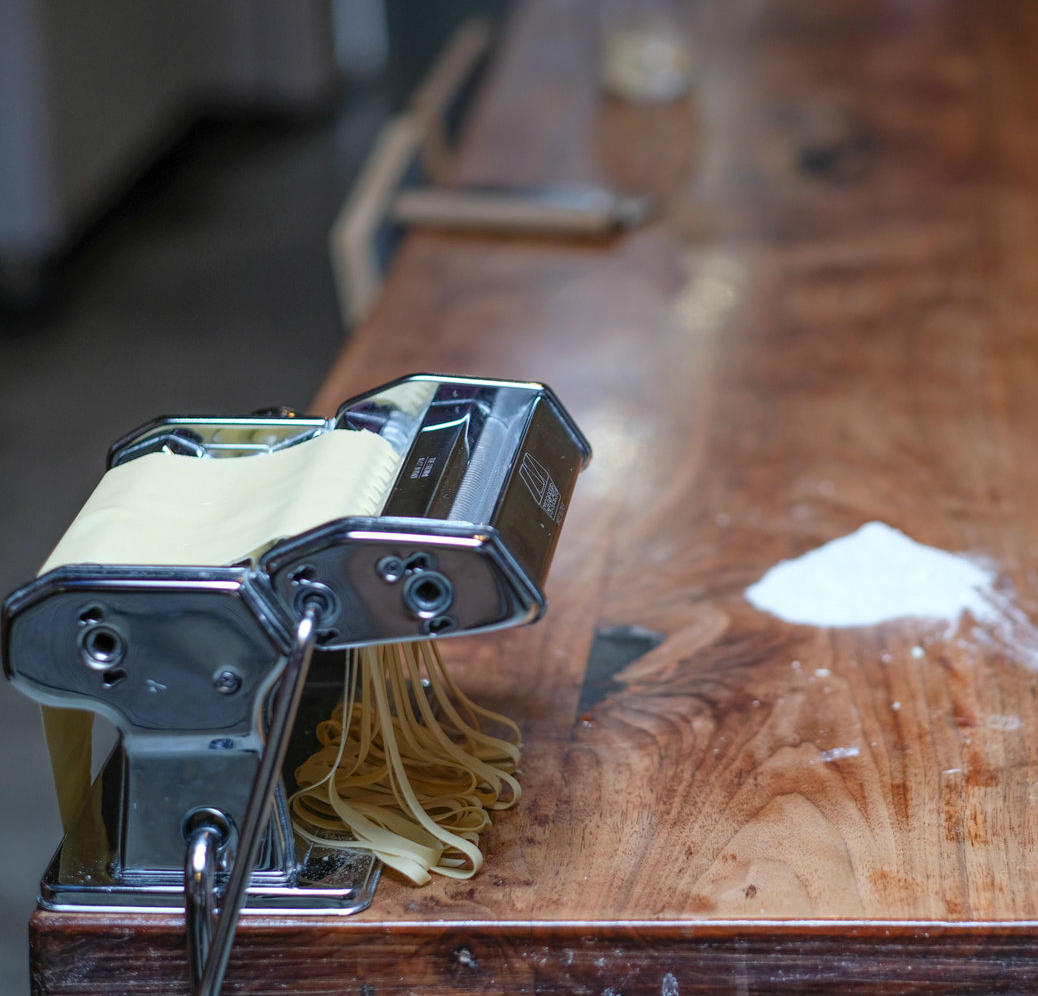“I exist on carbohydrates, pastas, sourdough bread, and beer,” declares Nik Palmer. “As long as you make it yourself, you can eat as much as you want.” After trailing up a mysterious downtown Vancouver building stairwell, I listen to Palmer speak to a collection of pasta enthusiasts inside his airy loft. This British entrepreneur is the founder of Palmer and Sons, a company dedicated to all things artisanal and handmade—from leather bags (once toted across New York Fashion Week), to tasty sourdoughs sprung from starters in his humble kitchen, to ramen noodles. Today, Palmer teaches the subtle art that is handmade pasta.
First thing’s first: location. “What you should do with pasta is, number one, make it on your dining table. Not on your countertop. Because countertops are far too tall,” says Palmer, with a hint of Northern England accent. He is captivating in both his energy and in his instructive nature, dividing the small group of us into pairs as he fixes his apron. We hover over the long wooden table lined with Bosa-bought pasta machines. All the ingredients for today’s experience are laid out before our eyes: the sand-like durum wheat semolina, the salt, and the free-range eggs (with the highest of Omega-3 fatty acids), most of which were purchased from Kingsway’s Famous Foods.
For this class, participants can choose between making fine egg-based tagliatelle or rustic semolina spaghetti. I opt for the latter, which Palmer acknowledges is the pasta he makes for his family. “There are seven chefs in my family,” he says, talking about what it’s like to cook with his kids (which I can only imagine inspired the name Palmer and Sons). We crack three eggs into a metal dish with a pinch of salt and two cups of Bob’s Red Mill Semolina, mixing it all together until the correct consistency is achieved. Palmer chirps about the surprising amount of protein found in noodles—a result of his “good quality eggs, good-quality pasta” mantra.
Palmer guides his hands over the dough, extending his arms back and forth. “Always work with the pasta near you and then put your body weight over it,” he instructs. “Mash, mash, mash. Flip it over. Mash, mash, mash. Flip it over. Break it apart so you can get the moist bit inside. Off you go.” There are no mixers in sight here—Palmer and Sons is all about tradition. “If you use a KitchenAid then all the carbohydrates you eat haven’t burnt off,” he says with a laugh, adding that using our hands to work with the dough “is like a CrossFit workout.” I’m happy to get a little physical activity from stretching and rolling out the mixture, which now feels like Play-Doh due to the activation of gluten.
Teaching the art of authentic food in Vancouver wasn’t always Palmer’s line of work. He originally immigrated to Canada to work in data and analytics for EA Games, but after years in the industry, he grew tired of the ongoing stress. Instead, it was the ability to be present, while creating something with his hands from start to finish, that really resonated with him. And for the past 12 years he’s done just that. He originally learned how to make pasta from a neighbouring Italian family when he just a teenager in Yorkshire; they showed him how making food over the course of the day can be a communal experience. “Italians would be making pasta for four or five families at once,” Palmer says. “This is a social event. This takes a ridiculous amount of time to make.”
For him, cooking classes are about human connection and getting back to basics. “Normally Grandma and Grandpa would show you how to cook,” he says. “But Grandma and Grandpa aren’t here for immigrants like me.” After we all finish navigating the pasta through the stainless-steel machine, which strings the dough into spaghetti, Palmer throws some of the noodles into softly boiling water and then serves some lightly garnished samples al dente. “What we try to do is teach them what Grandma and Grandpa would have taught them,” he continues. “Rather than the super fancy stuff—you don’t have the time, you don’t have the equipment—instead, we teach them more normal things.”
Later that evening, I open up some of the noodles that I took home with me: my first plate of my own handmade pasta. It’s incredibly, most remarkably, delicious. And just like Palmer, I intend on eating as much as I want.
Read more from Food and Drink.









